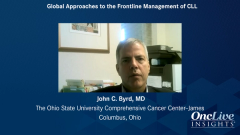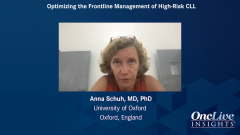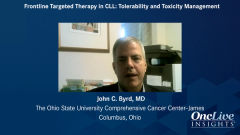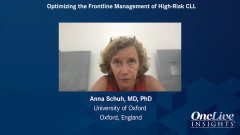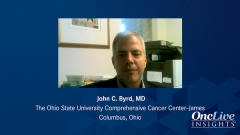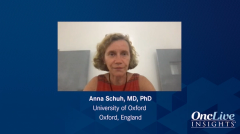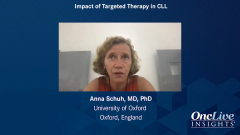
Frontline Targeted Therapy in CLL: Tolerability and Toxicity Management
A comprehensive breakdown of the tolerability of frontline targeted therapies used to manage chronic lymphocytic leukemia and toxicity management.
Episodes in this series

Paolo Ghia, MD, PhD: During the years in which the second-generation BTK [Bruton tyrosine kinase] inhibitor acalabrutinib was tested in different studies, we got the impression that the drug could be better tolerated than the first-generation ibrutinib. Indeed, we saw in each study an apparent lower cardiac toxicity. That was confirmed in a pool analysis by Dr Jennifer Brown showing that the frequency of atrial fibrillation and hypertension could be lower in patients treated with acalabrutinib. This has been confirmed recently by the results of the initial analysis of the head-to-head comparison between ibrutinib and acalabrutinib in the elevated relapsed/refractory study where patients with either 17p deletion or 11q deletion have been enrolled in the relapsed/refractory setting and then randomized to either ibrutinib or acalabrutinib.
After almost 4 years of follow-up, the primary end point was met in terms of efficacy: acalabrutinib isn’t inferior to ibrutinib in terms of progression-free survival, with a hazard ratio of 1.00. But what acalabrutinib showed was confirmed to be safer and better tolerated. We have less atrial fibrillation: 9% with acalabrutinib compared with 16% with ibrutinib within 4 years of treatment. We have less hypertension occurring, nearly in the range of 7%, 8% with acalabrutinib. We also have less mild bleeding, which is also another typical adverse event with a BTK inhibitor. In addition, what we call new sense adverse events were also reduced like, for example, arthralgia and myalgia. This is suggesting that besides being better tolerated from a cardiovascular point of view, it’s also better tolerated in terms of quality of life in general.
John C. Byrd, MD: Venetoclax took a hard-hit path into between the CLL [chronic lymphocytic leukemia] because early on we saw toxicity: a tumor lysis that was fatal on a couple of patients. It put the program on hold. It’s an incredibly active drug, and we’ve gotten much better at managing that based on the risk. The risk is generally related to the amount of tumor bowl, big lymph nodes, and blood disease. The algorithm either starts the dose escalation very slowly over 4 weeks, and in high-risk patients bringing them in for monitoring for tumor lysis or rapidly escalating them. That’s something we do often if we think somebody needs to get on therapy and has abrogated that adverse effect.
As any new-drug moves into the clinic, you see things that sometimes weren’t seen in clinical trials. With venetoclax, we’ve discovered that some people will have GI [gastrointestinal] upset. They’ll take it in the evening with food, sometimes even before they go to bed, because if you do have nausea with a drug and you take it before you go to bed, then most people who are sleeping aren’t aware that they’re nauseated. We work around things like that.
With the BTK inhibitors, we’ve had even more experience. Those have been combined with venetoclax applying the same rules, but in particular with the GI symptoms of spacing therapy. Some patients develop loose stools, for instance, on the combination of ibrutinib and venetoclax, for which 1 can give colestipol, Lomotil, or something that will slow things down a little and get patients through therapy. Those therapies are time limited—these are very effective therapies. In evolution, a lot of things have come forth from doctors treating patients and using knacks that they effectively use with other therapies.
Transcript Edited for Clarity



